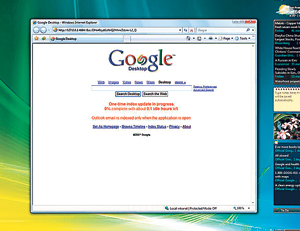Google as we all know is one of several search engines that are available on the Internet. Over the years it has become so popular that the word "search engine" has now become synonymous with "Google". Having started off as a research project back in 1996 by Larry Page and Sergey Brin at Stanford University, Google has now become a billion-dollar company with over 20,000 employees.
Why Google?
What attracts Internet users to Google? There are several reasons. Firstly, Google has a very simple, easy to use search engine. In less than two seconds you get the web page which has a very clean design with the search box and some variable options. That's it! Secondly, the accuracy and speeds at which results are returned from search queries is incredibly fast. The software behind the search technology includes the patented PageRankTM algorithm and Hypertext-Matching Analysis, which when combined gives the search engine the power to do a series of simultaneous calculations that only takes a fraction of a second.
How does Google make money?
Google lets you search for any kind of information on the Internet, for free. So how do they make money? The answer is an incredibly simple model which has brought in over 99% of their total revenue. The model is based on pay-per-click advertisement or PPC. Let's think of an example, to better understand it.
Imagine the user is searching for "Sri Lankan Tea". It could be that he is searching for an online shop to purchase Sri Lankan Tea or perhaps looking for tea estates in Sri Lanka. Google will go and find the most relevant web pages on this topic.
 |
Now imagine you own a tea shop. If somebody told you that they would let you show your advertisement to this specific user exactly when he's expressed interest in Sri Lankan tea (meaning a user who has entered the keywords Sri Lanka and/or Tea), would you be interested? Sure you would! This is what Google do: not only do they find the relevant web pages; they also find the most relevant ads and show them in the form of sponsored links. Each time a user clicks on your ad, in effect Google has sent you a lead – someone who is likely to buy something from your shop.
This lead is obviously valuable to you and you're willing to pay for it. Question is, how much? It turns out that there is another person who has a tea shop and is your direct competitor. He too is willing to pay to get that lead. So who gets the lead and gets to show their ad to this user? It comes down to a bidding of the price. Whoever is willing to pay more to get the lead will get their ads shown more frequently.
Note that you are paying "per-click" and not for showing the ad. So it's a really good deal – where you only have to pay when a user is interested enough to click on the ad and come to your site. The rates at which leads are paid for are in the range of dollar cents. So essentially it's not a lot of money for a tea shop owner.
But think of Google with this model in play. Lots of advertisers bidding on millions of keywords and hundreds of million users doing billions of searches at a tiny charge per click on an ad, and you get a pile load of cash!
Google offers this service through the Google AdWords program. This provides all the instructions for web advertisers to display advertisements in Google search results based on the PPC scheme. Google Adsense allows website owners to display ads on their own site and earn some portion of money every time ads are clicked.
Google products
Most people know Google only as a search engine. But in fact, they have several desktop applications and enterprise products. Here are a few:
Google Desktop: A desktop search software that allows searching of user emails and other files in your computer and finds, and launches applications with shortcut keystrokes. (I use this!)
Picasa: A software application for organising and editing digital photos.
Google Chrome: An open-source web browser
Google Apps Premier Edition: A service that caters to small businesses offering web applications with similar functionality to traditional office applications including : Gmail, Google calendar, IM and Google Docs (web based word processing, spreadsheets, and presentations applications).
Did you know?
The name "Google" was actually an accident. When Larry and Sergey first started the company they named it "Googol" which is the mathematical term for a "1 followed by 100 zeros". It got changed when their first customer wrote a cheque mistakenly addressing it to "Google". |


